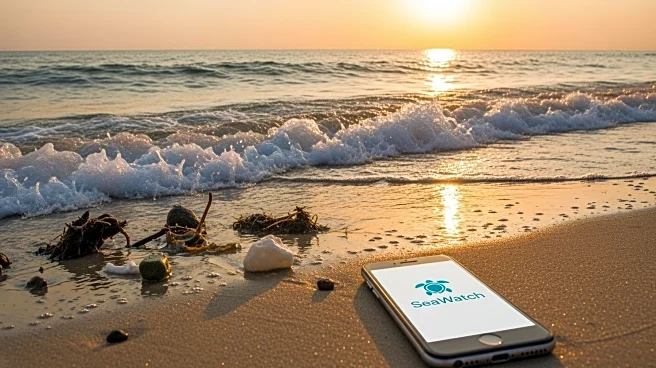What's Happening?
The Society for the Protection of Nature in Israel (SPNI) has reported an increase in sea turtle injuries along Israel's coast due to marine debris, as documented through their SeaWatch app. A recent case
involved a young green sea turtle, named Oriyan, found entangled in plastic waste off Ashdod's shores. The turtle was taken to the National Sea Turtle Rescue Center for treatment. The app, which allows users to report marine hazards, has highlighted the significant threat posed by plastic pollution, particularly from abandoned fishing gear. According to SPNI's SeaWatch coordinator, Bar Sternbach, approximately 12 million tons of plastic waste enter the oceans annually, with fishing gear comprising about 10% of this pollution. The app has facilitated over 5,500 reports, aiding in the protection of marine ecosystems.
Why It's Important?
The increase in marine debris poses a severe threat to marine life, particularly vulnerable species like sea turtles. The SeaWatch app's ability to report and address these hazards is crucial for conservation efforts. The data collected through the app underscores the need for systemic solutions to reduce plastic pollution and protect marine biodiversity. The app's success in engaging the public in conservation efforts highlights the importance of community involvement in environmental protection. The ongoing threat to sea turtles and other marine species emphasizes the need for enhanced regulatory measures and public awareness to mitigate the impact of marine debris.
What's Next?
The SeaWatch app will continue to play a vital role in monitoring and reporting marine hazards. The SPNI plans to expand its efforts by advocating for more no-fishing zones and promoting the use of circular hooks to minimize accidental catches of non-target species. The ongoing rehabilitation of injured sea turtles like Oriyan will be closely monitored, with plans to release them back into the wild once they recover. The app's data will be used to inform policy decisions and enhance marine conservation strategies, aiming to reduce the impact of plastic pollution on marine ecosystems.
Beyond the Headlines
The SeaWatch app's success in Israel could serve as a model for other regions facing similar challenges with marine debris. The app's ability to engage the public in real-time reporting and conservation efforts highlights the potential for technology to drive environmental change. The ethical implications of marine pollution, particularly its impact on vulnerable species, call for a reevaluation of current fishing practices and waste management policies. The long-term goal is to achieve a sustainable balance between human activities and marine conservation, ensuring the protection of biodiversity for future generations.










